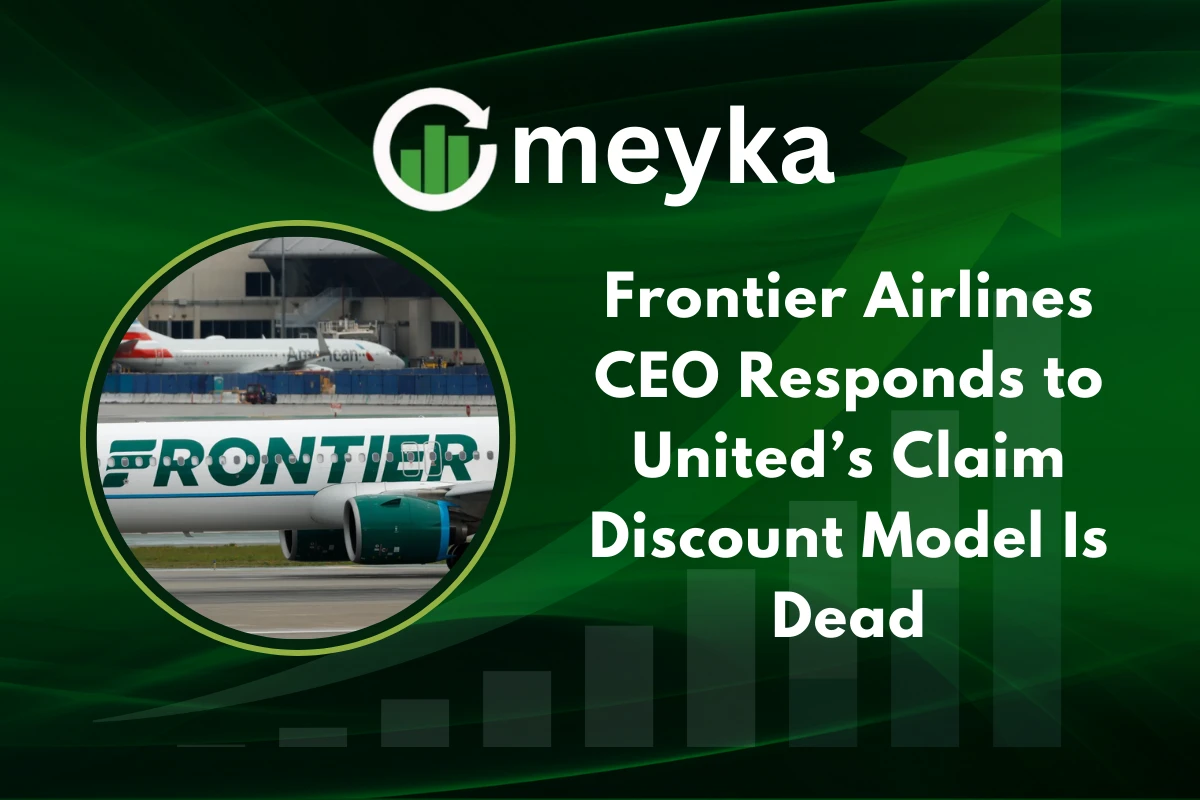Frontier Airlines CEO Responds to United’s Claim Discount Model Is Dead
The debate over the future of cheap flying turned public when United Airlines’ chief executive called the discount airline model a failed experiment, and Frontier Airlines pushed back sharply.
Frontier Airlines said the ultra-low cost carrier model is alive and well, and its CEO gave a two-word clap back that went viral. This showdown matters because it affects fares, routes, and the choices travelers see when they book.
Frontier Airlines and United, the public spat
United CEO Scott Kirby recently said the ultra-low-cost carrier model had not worked, calling it an experiment that failed. His comments followed financial trouble at Spirit Airlines and a broader industry debate about sustainability.
Frontier Airlines CEO Barry Biffle answered directly at a travel conference, saying the model is working and that some comments were “cute.” The exchange highlights a growing divide between legacy carriers and discount operators.
Why did United call the model dead?
Kirby argued that consumers prefer fuller service and better reliability, and he pointed to Spirit’s struggles as evidence that deep discount models may not last.
He told industry forums that the math did not add up for no frills carriers, and that some airlines would not survive without major changes. The point of his critique was that rising costs and changing demand can make the old playbook hard to sustain.
How did Frontier Airlines respond?
Barry Biffle fired back with a short, pointed retort, saying the model is alive and well and calling the debate “cute.” He pointed to Frontier’s own expansion plans and argued that the market has too many seats overall, a structural issue that affects yields for all carriers.
Frontier has announced dozens of new routes and plans to adapt its product mix to win passengers.
What is the ultra-low-cost carrier model?
The ultra-low cost carrier model focuses on a low base fare, and the airline sells add-ons like bags and seat selection. That approach lowers headline prices, and it can open travel to price-sensitive flyers. Critics say fees can add up, and extreme cost-cutting can harm service. Supporters say the model is capital efficient, and it can work when managed tightly.
The model has evolved, and carriers now test bundled options and loyalty add-ons to broaden appeal.
What does this mean for travelers?
For travelers, the clash matters in simple ways. More aggressive ULCC growth can mean lower base fares for many routes, but it can also mean more fees and fewer included services.
If legacy carriers change baggage policies and capacity, travelers may see shifting price patterns. Frontier Airlines says it will push into markets vacated by rivals, which could give consumers more cheap options on some routes.
Frontier Airlines’ strategy and recent moves
The Airlines is leaning into growth while the sector reshuffles. The airline has added new routes, and it sees an opportunity after Spirit’s financial troubles.
Frontier is also testing product changes, like adding a first-class cabin in the coming years and growing loyalty revenue, moves meant to broaden appeal beyond the most price-sensitive flyers. Those steps are part of why the airline says the model can adapt.
How are other airlines reacting?
Other ULCCs like Spirit and Allegiant face pressure, and legacy airlines like United and Southwest are adjusting their own offers. United’s public critique is also a strategic message; it frames competition as risky to passengers and aims to influence regulators and public opinion.
The industry watching these comments includes investors and travel writers, and the outcome will shape capacity and fares across many routes.
Social reaction and coverage
The exchange sparked a quick social reaction. Aviation accounts on X posted clips and summaries, travel writers amplified the exchange, and finance and investor forums picked over the numbers. That kind of social traction helps shape the public story and investor conversations.
“Frontier Airlines CEO Barry Biffle has fired back at United Airlines CEO Scott Kirby, saying ‘That’s cute’ and defending the low fare model.”
A short YouTube clip also shows Biffle at the Skift conference, and the video helps viewers see tone and audience reaction for themselves. That context often matters more than a single line in a transcript.
Can the model survive rising costs?
Rising fuel prices and inflation place pressure on every airline. The ultra-low cost model survives when an airline keeps unit costs low, matches capacity to demand, and monetizes add-on sales effectively.
Frontier Airlines argues it has a cost advantage on many routes and that a shrinking seat count across the industry could improve yields for all carriers. Still, the model is sensitive to big cost shocks and regulatory change, so its success is not automatic.
Practical advice for travelers
If you chase the lowest fare, add in expected fees for baggage and seats before you book, and compare the total cost across carriers. For frequent flyers who value comfort, legacy carriers may still be better. Watch routes, enroll in loyalty programs, and pick the option that fits your travel style.
Final take on Frontier Airlines and the debate
The public spat between United and Frontier Airlines is a flash point in a longer industry shift. Legacy airlines are defending margin and service models, and low-fare carriers are defending access and efficiency.
For travelers, the likely outcome is continued choice, with cheap base fares on some routes and more bundled options from ULCCs. The market will test which approach best fits changing demand and costs.
Conclusion:
The clash shows industry change. Frontier says the model is sustainable, and United doubts it. Travelers may benefit from more competition, though higher costs and fewer seats could reshape choices. Expect more experiments as airlines chase profit and customer loyalty.
FAQ’S
United’s CEO Scott Kirby argued that ultra-low-cost carriers are struggling with rising costs and changing passenger expectations, pointing to Spirit Airlines’ losses as proof.
Frontier Airlines CEO Barry Biffle dismissed the criticism with a two-word response, saying the model is “alive and well” and highlighting Frontier’s growth plans.
For travelers, the clash affects fares and service. Frontier Airlines promises cheaper base fares, while United focuses on full service and reliability.
Experts say the model can survive if airlines manage costs tightly and diversify revenue, but inflation and fuel prices remain key risks.
Many travelers see Frontier Airlines as the cheaper option but with extra fees, while United is viewed as more reliable but pricier. Social media shows mixed opinions.
Disclaimer
The above information is based on current market data, which is subject to change, and does not constitute financial advice. Always do your research.






